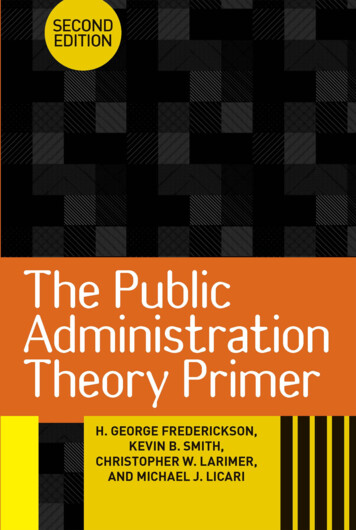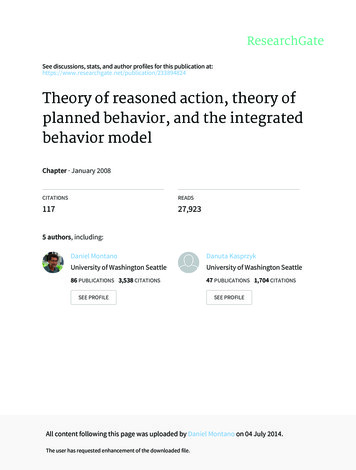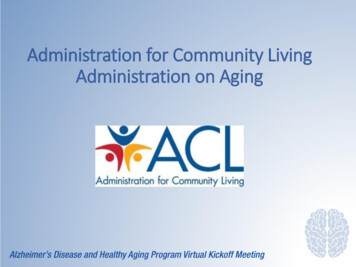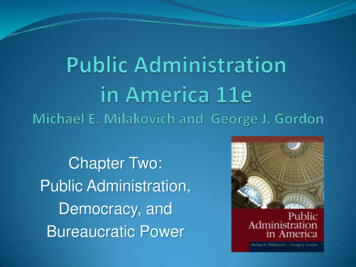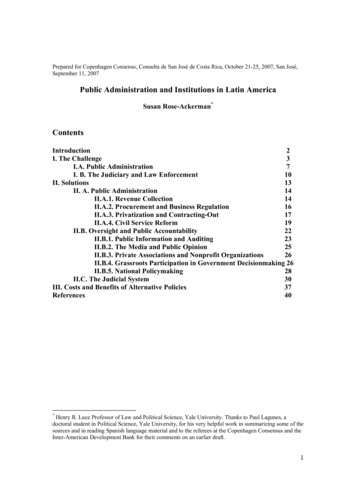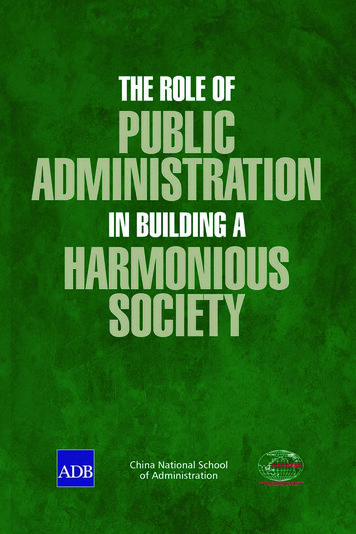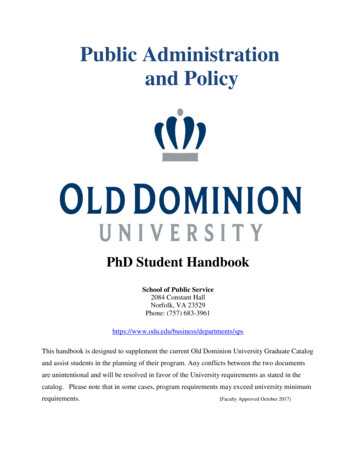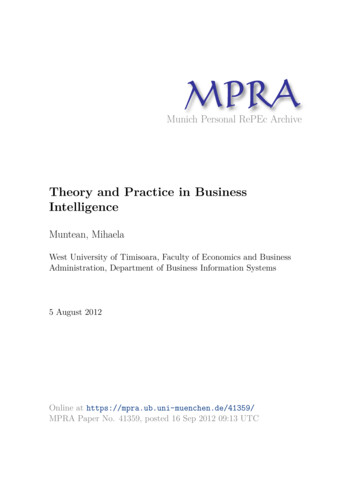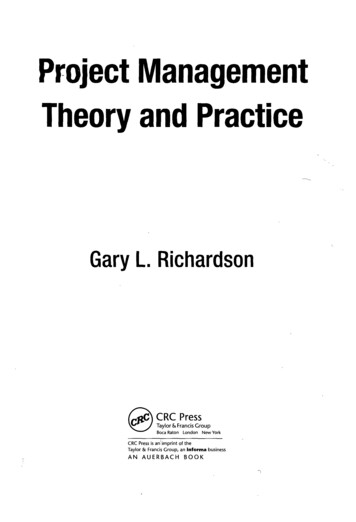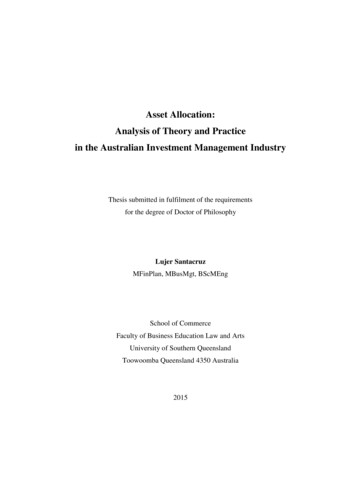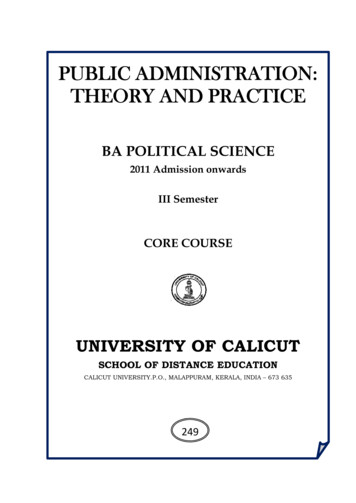
Transcription
PUBLIC ADMINISTRATION:THEORY AND PRACTICEBA POLITICAL SCIENCE2011 Admission onwardsIII SemesterCORE COURSEUNIVERSITY OF CALICUTSCHOOL OF DISTANCE EDUCATIONCALICUT UNIVERSITY.P.O., MALAPPURAM, KERALA, INDIA – 673 635249
School of Distance EducationUNIVERSITY OF CALICUTSCHOOL OF DISTANCE EDUCATIONSTUDY MATERIALBA POLITICAL SCIENCEIII SemesterCORE COURSEPUBLIC ADMINISTRATION: THEORY AND PRACTICEPrepared by:Sri.Jipson.V.Paul,Assistant Professor,PG Department of Political Science,St.Mary’s College,Sulthan Bathery,WayanadScrutinised by:Dr.G.Sadanandan,Associate Professor and Head,PG Dept. of Political Science,SKV College, ThrissurLayout & SettingsComputer Section, SDE ReservedPublic Administration: Theory and PracticePage 2
School of Distance EducationCONTENTSMODULE I05-13MODULE II14-23MODULE III24-33MODULE IV34-41MODULE V42-53MODULE VI54-59Public Administration: Theory and PracticePage 3
School of Distance EducationPublic Administration: Theory and PracticePage 4
School of Distance EducationMODULE- IDEFINITION, NATURE, SCOPE AND IMPORTANCE OF PUBLICADMINISTRATION - PUBLIC ADMINISTRATION AND PRIVATEADMINISTRATIONPublic Administration is an aspect of a more generic concept of administration.Public Administration houses the implementation of government policy and an academicdiscipline that studies this implementation and that prepares civil servants for this work.Some of the various definitions which have been offered for them are: the management ofpublic programmes; and the study of government decision making, the analysis of thepolicies themselves, the various inputs that have produced them, and the inputs necessaryto produce alternative policies. Public Administration is centrally concerned with theorganization of government policies and programmes as well as the behaviour of officialsformally responsible for their conduct.Before understanding the meaning of public administration, it is necessary tounderstand the meaning of the word ‘administration’. The English word ‘administer’ isderived from a combination of two Latin words ‘ad’ and ‘ministrate’ meaning ‘to serve ormanage’. Literally, the term ‘administration’ means management the affairs of public orprivate. Administration refers to mobilisation of resources – human and material- toachieve pre-set of objectives. Administration is thus an activity undertaken in pursuit ofthe realisation of a goal. It is an effort requiring a group of persons, each individuallycarrying out certain allotted tasks, which when so performed by all, leads to theachievement of an objective which has already been established and made explicit.Public Administration is a part, even though a large and important part, ofadministration. Administration means performance of the executive functions of the state.Public Administration lends itself to two usages. It refers to the practice. Also, it means afield of intellectual enquiry or discipline. Public Administration refers to the study of theactivities of the State, but these activities may relate to the executive or the legislature orthe judiciary. Many thinkers restrict it to the executive. But some scholars would havebroaden the definition of the term and extended it to all the three branches. PublicAdministration refers to the organisation and management of activities financed from thetax-payer’s money.In the USA, civil servants and academics such as Woodrow Wilson promotedAmerican civil service reform in 1880, moving public administration in to academia.Woodrow Wilson is considered the father of public administration.As a discipline, public administration is a post-1947 growth in India. Despite beingvery young discipline in a family of social science, it has shot into prominence; and today itis a very popular subject. Public Administration is the front of the government, being itsvisible face. The visibility of public administration is conspicuous and continues. While thegovernment observes fixed hours of working but public administration is ever at work.Public Administration: Theory and PracticePage 5
School of Distance EducationWith the ushering in an era of welfare states, the administration is construed as a “moralact” and “administrator as a moral agent”. Public Administration has become themachinery for formulating plans and programmes and carrying them out. All this revealsthat Public Administration is imperative for all societies -developed or developing,dictatorial or democratic.The Meaning of Public AdministrationThe conventional view of the public administration is that it discusses only theprocesses, leaving aside the substantive concerns. Thus it concerns itself with planning,organisation, staffing, directing, coordinating, reporting, budgeting, evaluating, etc. Theadvent of public policy studies has obliged the public administration to study contents ofpublic policies. This is a substantive field. Therefore, public administration deals not onlywith the processes but also the substantive field.Public Administration is a part of the wider field of administration. Administrationis a process permeating all collective effort, be in public or private, civil or military, largescale or otherwise, and is thus of universal nature. Administration, being characteristic ofall enterprises in pursuit of conscious purposes, and is not a peculiarity of modern agealone. Public Administration of today, however, has three distinguishing features: Itspurpose have been completely reoriented, its functions have enormously increased innumber, variety and complexity, and its methodology has enormously increased innumber, variety and complexity, and methodology has grown from trial-and- error stageinto an orderly discipline with an organized, ever-increasing body of knowledge andexperience.Public Administration exists in a political system for the accomplishment of thegoals and objectives formulated by the political decision makers. It is also known asgovernmental administration because the adjective ‘public’ in the word ‘publicadministration’ means ‘government’. Hence, the focus of public administration is on publicbureaucracy, that is, bureaucratic organisation (or administrative organisation) of thegovernment.Public Administration has gained greater importance since the emergence ofAdministrative State. It is an instrument not only for protecting and restraining but alsofostering and promoting. Its contents, today, are more positive in nature for it is nowengaged in looking after myriad needs of human life- health, education, recreation,sanitation, social security, etc. It is, therefore, a creative factor, its motto being the ‘welfareof man’. These functions are in addition to its basic functions of maintaining law and orderin society. In nature, contents and scope – all go to make it the ‘heart of the problem ofmodern government’. A country’s progress is, thus, largely determined by the quality of itspublic administration. In the analysis, Administration is a moral act and administrator is amoral agent. This thesis is basic to the transformation which is needed in publicadministration to make it an effective instrument for the ushering in of the democraticwelfare state.Public Administration: Theory and PracticePage 6
School of Distance EducationPublic Administration is the machinery used by the service state to place itself in aposition to make plans and programmes that can carried out, and to carry out the plansand programmes it has made. Administration is of importance for another reason too. It isessentially national character makes it a powerful instrument of national integration.Public Administration is the first need of a society, more so of a developing country likeIndia, which has chalked out for herself numerous plans of economic and socialbetterment.“Administration”, as E N. Gladden says, “is a long and slightly pompous word, butit has humble meaning”. The word administer, derived from the Latin word ad ministrate, means to care for or to look after people, to manage affairs. Administration is aprocess permeating all collective effort, be it public or private, civil or military, large scaleor otherwise, and it thus universal nature. Public Administration of today, however, hasdistinguishing features: its purpose has been completely reoriented, their functions haveenormously increased in number, variety and complexity, and its discipline ever increasedbody of knowledge and experience.In the words of Woodrow Wilson, “Public administration is detailed and systematicapplication of law”. Every particular application of law is an act of administration.Pfiffner defines Public administration consists of all those operations having fortheir purpose the fulfilment or enforcement of public policy.According to Gladden, “Public administration concerned with the administration ofthe government.”Professor L D. White observes, “Public administration consist of all those operationshaving for their purpose the fulfilment or enforcement of public policy”.According to Luther Gullick, “Public Administration is that part of the science ofadministration which has to do with government and thus concern itself primarily with theexecutive branch where the work of the Government is done”Waldo defines Public Administration as “the art and science of management asapplied to the affairs of state.”Public Administration lends itself to two usages: it is an activity; and it also refers to thediscipline (or subject) of intellectual inquiry and study. Maintaining law and order is anactivity and is part of public administration. But public administration is also a discipline likeEconomics, Sociology, History etc., and is a subject of study : it studies these activities andfunctions, formulates concepts and builds models and theories. The above definitions pointout that the term Public Administration has been used in two senses. In the wider sense itincludes all the activities of the government whether in the sphere of the legislative, executiveor judicial branch of the government. This wider view has been taken by L D. White,Woodrow Wilson, Pfiffner and Marshall Dimock. In the narrow sense public administration isconcerned activities of the executive branch only. This view has been taken by Gullick, Simon,Willoughby, Fayol and Ordway Tead. By common usage and practice the term ‘publicadministration’ is restricted to the organisation and operations of the executive branch only.Public Administration may thus be defined as government in action.Public Administration: Theory and PracticePage 7
School of Distance EducationNATURE OF PUBLIC ADMINSTRATIONThere are two divergent views regarding the nature of Public Administration. Theseviews are:(a). Integral ViewAccording to this view, public administration is sum total of all the activitiesundertaken in pursuit of and in fulfilment of public policy. These activities include notonly managerial and technical but also manual and clerical. Thus the activities of allpersons from top to bottom constitute although they are of varying significance to runningof administrative machinery. L D. White shares this view. According to him, PublicAdministration “consists of all those operations having for their purpose the fulfilment orenforcement of public policy. This definition covers a multitude of particular operations inmany fields – the delivery of a letter, the of public land, the negotiation of treaty, the awardof compensation to an injured workman, the removal of a litter from a park, and licensingthe use of atomic energy.Similarly, Dimock holds that administration is concerned with the ‘what’ and ‘how’of the government. The ‘what’ is the subject matter, the technical knowledge of a field whichenables the administration to perform his tasks. The ‘how’ is the technique of management,the principles according to which cooperative programmes are carried to success.(b). Managerial ViewAccording to this view, the work of only those persons who are engaged in theperformance of managerial functions in an organisation constitute administration. It isthese persons who shoulder the responsibility of keeping the enterprise on keel and to runit most efficiently. Their job is to plan, programme and organize all the activities in anorganistion so as to achieve the desired ends.Simon Smithburg, Thompson and Luther Gullick subscribe to this view ofadministration. Luther Gullick says, ‘Administration has to do with getting things done;with accomplishment of defined objectives’. The term administration is also used innarrower sense to refer to those patterns of behaviours that are common to many kinds ofco-operating groups or the specific technological methods used to reach these goals.The above two views differ from each other in many ways. The integral viewincludes the activities of all persons engaged in administration whereas the managerialview restricts itself only to the activities of a few persons at the top. The integral viewpostulates all types of activities from manual to managerial, from non- technical totechnical whereas managerial view takes into account only the managerial activities in anorganisation. Luther Gullick defines these techniques by the letters of the word:POSDCORB which means Planning, Organisation, Staffing, Direction, Co-ordinating,Reporting and Budgeting. As study public administration examines the every aspects ofgovernment’s effort to discharge the laws and give effect to public policy; as a process it isall the steps taken between the time an enforcement agency assumes jurisdiction and thelast break is placed; and as a vocation, it is organising and directing the activities of othersin a public agency.Public Administration: Theory and PracticePage 8
School of Distance EducationSCOPE OF PUBLIC ADMINISTRATIONThere is no unanimous opinion regarding the scope of public administration. Thereare two different views explaining the subject matter of public administration. They arePOSDCORB view and the subject
Public Administration is the first need of a society, more so of a developing country like India, which has chalked out for herself numerous plans of economic and social betterment. “Administration”, as E N. Gladden says, “is a long and slightly pompous word, but it has humble meaning”. The word administer, derived from the Latin word ad ministrate, means to care for or to look after .
